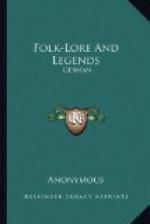PREFATORY NOTE
The distinctive features of Scotch Folk-lore are such as might have been expected from a consideration of the characteristics of Scotch scenery. The rugged grandeur of the mountain, the solemn influence of the widespreading moor, the dark face of the deep mountain loch, the babbling of the little stream, seem all to be reflected in the popular tales and superstitions. The acquaintance with nature in a severe, grand, and somewhat terrible form must necessarily have its effect on the human mind, and the Scotch mind and character bear the impress of their natural surroundings. The fairies, the brownies, the bogles of Scotland are the same beings as those with whom the Irish have peopled the hills, the nooks, and the streams of their land, yet how different, how distinguished from their counterparts, how clothed, as it were, in the national dress!
CANOBIE DICK AND THOMAS OF ERCILDOUN.
Now it chanced many years since that there lived on the Borders a jolly rattling horse-cowper, who was remarkable for a reckless and fearless temper, which made him much admired and a little dreaded amongst his neighbours. One moonlight night, as he rode over Bowden Moor, on the west side of the Eildon Hills, the scene of Thomas the Rhymer’s prophecies, and often mentioned in his history, having a brace of horses along with him, which he had not been able to dispose of, he met a man of venerable appearance and singularly antique dress, who, to his great surprise, asked the price of his horses, and began to chaffer with him on the subject. To Canobie Dick, for so shall we call our Border dealer, a chap was a chap, and he would have sold a horse to the devil himself, without minding his cloven hoof, and would have probably cheated Old Nick into the bargain. The stranger paid the price they agreed on, and all that puzzled Dick in the transaction was, that the gold which he received was in unicorns, bonnet-pieces, and other ancient coins, which would have been invaluable to collectors, but were rather troublesome in modern currency. It was gold, however, and therefore Dick contrived to get better value for the coin than he perhaps gave to his customer. By the command of so good a merchant, he brought horses to the same spot more than once; the purchaser only stipulating that he should always come by night and alone. I do not know whether it was from mere curiosity, or whether some hope of gain mixed with it, but after Dick had sold several horses in this way, he began to complain that dry bargains were unlucky, and to hint, that since his chap must live in the neighbourhood, he ought, in the courtesy of dealing, to treat him to half a mutchkin.
“You may see my dwelling if you will,” said the stranger; “but if you lose courage at what you see there, you will rue it all your life.”




